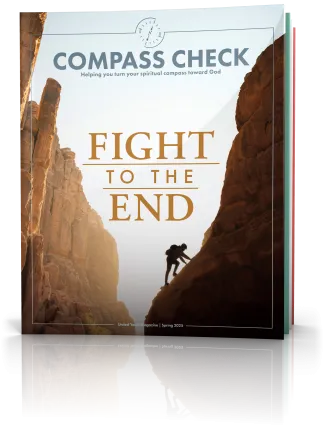Notes on The Way: Christine Hendrickson

Interviews showcasing a diverse range of life and career stories, with helpful notes on the way of life as a Christian. Today's subject: Christine Hendrickson, CNP, MSN, family practice nurse practitioner currently working per diem for Optum walk-in clinic in Everett Washington.
How were you called into the Way?
Well, I came into the Church in 1975 [as a child] with my parents and my grandparents. And you know at first, it’s their journey, and then it becomes your journey. As a kid, I didn’t really get it. I loved it. I loved my friends, I loved the Feast, but I didn’t really get it until I started digging in and making it my own. And I probably started making it my own a little bit in ‘89, when I started with the correspondence course, and then all the booklets, and then reached out after I was married, and really kind of coming back. So, very happy to be here. It’s a blessing.
What is your line of work? Can you explain a little bit more about what being a nurse practitioner means?
So, it’s an advanced practice. As a nurse practitioner, I actually see patients. I’m what they call a provider. A provider sees patients. I write prescriptions, I write medications. I can order your lab tests and your CAT scans and send you off and refer you.
I, as a nurse practitioner in California, could have opened my own practice and seen patients, and had my own family practice. All I legally had to do was be able to have a physician on call, as a backup. But I’m pretty capable of almost everything a doc does.
It’s a great job. I’m very, very thankful that I’m able to do what I am able to do.
What drew you to being a nurse practitioner?
It started with my mom, who was a nurse. When I was a teenager, she would be in there on Sundays, doing paperwork [as a manager], and I would go in with her because they had a patient who was a child, a baby. And there weren’t enough nurses, so I would go in on Sundays and after school to help them with this baby, and feed and play, because the baby had no family.
So, it melted in my heart and I kind of thought, ‘You know what? I could be a nurse. I could do this.’ And so, I went from there.
What sort of education did you get to prepare for your career? What has been your career path?
I was very fortunate in my high school program, that they had the Southern California Occupational Center, and I went to a tech school during my high school years. And I got my nursing assistant and my front office (administrative work) / back office (medical assistant) during high school.
I was planning on continuing school and being a nurse. Well, I had a sidetrack in high school. I made some poor choices, and I ended up getting married a couple weeks after graduating high school. I was still working, but I didn’t get back to school until ‘89, and then I started with my nursing when I had three kids.
I went back to school and I actually have two associates. I have an associate in science, because you have to take the anatomy and the physio, all of the chemistries, etc. And then you have a 2-year nursing program. So, it wasn’t until ‘95 when I finally graduated with my associate degree in nursing.
I did 2 years of critical care classes just to get myself better prepared for the ER and then I ended up as an ER charge nurse. And I went through the paramedic program, so I would be the one that the paramedics would call.
I got my master’s [two years], and then it was another year and a half of a certificate nurse practitioner program, where you kind of did a residency like the docs do. I graduated in 2005.
I was never expecting to go that far. But, it was fabulous. Yeah, it’s been a great career. It’s been almost 19 years.
Would you recommend being a nurse first before going for the nurse practitioner?
Most definitely because it gives you that sixth sense, right? God gives me that sense that there’s something wrong. That this isn’t right. And then to do that one more test, or that one more thing.
There’s not a day I don’t get up and get on my knees before I would go out the door, and say, “God, please, give me the sense to know the difference,” and I think if you’re young, and don’t have any experience, it’s hard to have that sense that something is really wrong and to do the right thing.
What are the elements of your job that you enjoy the most?
The people. I really love the one-on-one, and with the family. It’s funny, because even my docs and my nurses now and my other providers, they’ll say I’m a cheerleader, and they need to be more of a cheerleader, because sometimes it’s just going in and listening and telling somebody “you can do this,” “you’re doing a great job.”
What are some of the elements that you find more challenging about your job?
Probably people. We’ve come into a society that’s different. It’s changed since I started. You know it’s very hard to deal with the gender issues, and the people who walk in the door and they’re angry, and trying to get past all that anger to what’s really going on. I think there’s just a lot of anger out there now.
Sometimes it gets complicated when you can’t get the treatments right away that you want to get done.
At the clinic that I work at up here in Washington now, we used to have ultrasound, MRI, and CT seven days a week from 7 a.m. to 7:30 p.m. Now we’re lucky if I have it Monday through Friday until five o’clock, and some days I don’t even have x-ray at certain sites because they might not have an x-ray tech that day. It’s just kind of hard because there are no techs.
In the workplace, have you personally encountered any moral dilemmas? And if so, can you describe how you handled that situation?
Well, I do have patients that are trying to change their genders. That’s always challenging. Trying to go in and treat them as human, and treat them with kindness and loving them, not disrespecting them. But also I don’t use any pronouns because the pronouns are very confusing.
And I’ve explained that to them. If you want to be called a “they” and you’re “Jerry.” I can’t use a “they,” I need to just use your name, because I need to know how many people are sick.
So, there’s certain things that I try to explain to my patients. It’s not that I’m trying to be disrespectful to you, but in my world I need to know what your background is, or what your genealogy is, and your genes, so that my medication will work properly, so I can treat you properly. So we don’t miss something important. That’s very tricky in this new world.
[Another issue is that] some people are just angry. It doesn’t matter how I handle it. They want to be mad. They want to be angry. I’m [like], “Okay, sorry, but you know I’m trying to do the best I can for you.”
So those are the challenges. The challenges are this new day and age of trying to do the right thing for each person, without missing something, and without making them feel like you’re not treating them the way they want to be treated.
There’s always challenges in every job, right? People are people, right? That’s God teaching us how to deal lovingly and kindly with people.
Was there ever a time where you stopped and thought, “Oh, I wish I was doing something else, or maybe I should make a change and do something in a different field”?
No, I really believe that God kind of puts us all where [we need to be]. And I really like what I do. I think this is where I’m supposed to be.
Is there any advice that you would give someone in high school, or even junior high, about pursuing a career that is personally fulfilling?
I would tell them that I would really encourage you to go job shadow if you could find somebody that’s doing the job that you think you want to do.
And then, I think my second advice would be, like me, no matter what it takes, no matter how many years it takes, just keep going, even if you’re doing one class a semester to keep your foot in that door. And keep going. Just keep going because it will pay off someday. You know it really will.
Would there be any additional advice that you would give to someone who wants to do the same kind of work that you do?
If there were somebody who lived close to me who wanted to job shadow, I would be more than welcoming. But I think job shadowing would really tell you whether or not this was something that you thought you could do.
I think what you really want to do is be a nurse first, and go through the different departments [to figure out what you like]. Because I knew that labor and delivery wasn’t my thing. Medical-surgical wasn’t my thing.
So, job training, and maybe job shadowing and no matter what, keep going. God’s got it. God definitely got me through all those years.
Thanks so much for your time Christine!







